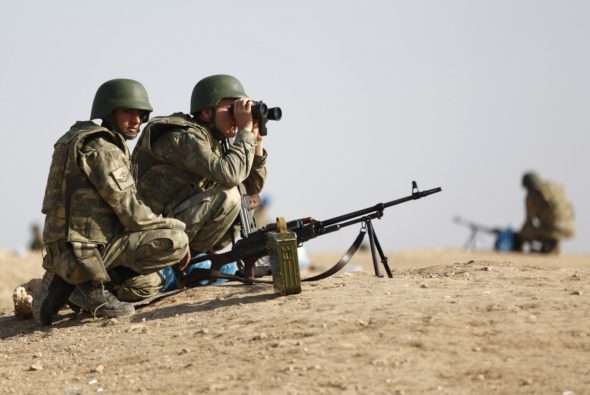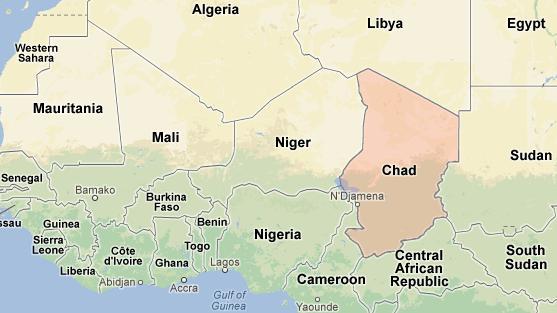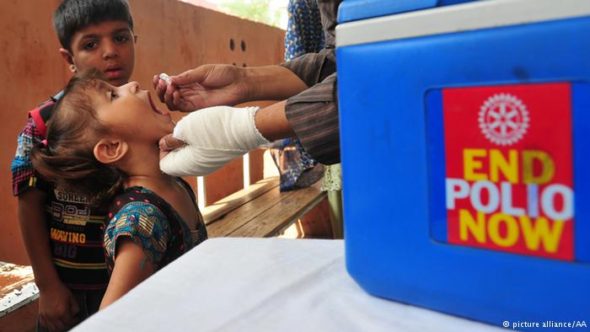News from Turkey, Chad and Pakistan
Tuesday's World Events — Posted on October 7, 2014

Turkish soldiers watch over the Syrian town of Kobani as they take position near Mursitpinar border crossing on the Turkish-Syrian border in the Turkish town of Suruc in southeastern Sanliurfa province October 4, 2014. Reuters.
TURKEY – Kobani: Isis flags raised near Turkish-Syrian border
Islamic State (ISIS) fighters are close to taking a town just a few miles from the Turkish border, a fight which would be a symbolic victory over the Kurds who declared self-rule there from Syrian President Bashar al-Assad in 2012.
Locals and analysts have warned that the radical jihadists will stage a massacre in the town of Kobani which has all but been abandoned by civilians. The fighters have now reached the southwestern outskirts of the city, according to the BBC.
Reports have also suggested that one Kurdish female fighter was captured by IS militants, blowing herself up to avoid capture. Al-Arabiya reported the woman was 19-year-old Ceylan Ozalp, who was interviewed by the BBC about women’s role in the Peshmerga Kurdish forces, but several on Twitter said Ozalp was still alive and fighting elsewhere.
Others on social media have questioned why the coalition airstrikes, led by the United States have not protected the town for the last 24 hours.
The leader of the Kurdish political party PYD, Salih Muslim, said there were no effective airstrikes taking place. “That is why the IS thinks it is safer to deploy most of its forces near Kobani in order to protect them from air strikes.”
 Turkish Prime Minister Ahmet Davutoglu has said that Turkey will do what it can to prevent Kobani falling into the hands of Islamic State, but in practice the Turkish government is reticent both to help the Kurds it has spent so long quashing within its own border, or to be the first country to commit ground troops to Syria.
Turkish Prime Minister Ahmet Davutoglu has said that Turkey will do what it can to prevent Kobani falling into the hands of Islamic State, but in practice the Turkish government is reticent both to help the Kurds it has spent so long quashing within its own border, or to be the first country to commit ground troops to Syria.
On Friday, Syria’s Foreign Ministry warned Turkey that deploying troops inside its borders would be seen as an act of aggression, and said that international leaders should act to “put limits to the adventures” of Turkey, which has been a key backer of Syrian opposition groups.
Nawaf Khalil, a spokesman for Syria’s leading Kurdish Democratic Union Party, said of Davutoglu: “How does he want to prevent the fall of Kobani and until now Turkey has done nothing.” Khalil said Kurdish fighters in the town “will fight until the last gunman and last gunwoman.”
A mortar shell fired from within Syria hit a house on the Turkish side of the border, injuring five people and leaving one with significant facial injuries, it was reported on Sunday.
The Office of the Governor of Şanlıurfa ordered the evacuation of two border villages, Küçükkendirli and Büyükkendirli because of the risk to Turks living there.
CHAD – Chad set to become 37th African state to ban homosexuality
N’DJAMENA, Chad — Government ministers of the West African nation of Chad voted on September 22 to make same-sex relations a crime, the 37th African nation to enact such a law.
Homosexuality is not currently illegal in Chad, but a section of a new penal code makes it punishable by 15 to 20 years imprisonment and a fine. The cabinet claims the intent of the law is to “protect the family and to comply with Chadian society.” It will go before Parliament members and then to President Idriss Deby for his signature; no dispute or objection is expected.
 Although the draft of the new penal code abolished the death penalty in Chad, international human rights groups condemned Section 361, the section concerned with anti-homosexuality.
Although the draft of the new penal code abolished the death penalty in Chad, international human rights groups condemned Section 361, the section concerned with anti-homosexuality.
“This is very good news (the cessation of the death penalty), which is unfortunately marred by the criminalization of homosexuality,” Florent Geel, Africa director of the International Federation of Human Rights, said on the Gay Star News website. “Criminalizing homosexuality seems discriminatory, demagogic and counter-productive, as it may turn groups against each other.”
Geel added that the reform of the penal code had been in preparation for 10 years but the question of homosexuality, while considered immoral, had never been an issue in Chad.
The development is part of a wave of opposition to homosexuality sweeping across Africa. Same-sex relations are illegal in 36 of the continent’s 54 countries, according to Amnesty International, and punishable by death in some.
Last month the Gambia passed a bill imposing life imprisonment for “aggravated homosexuality” relating to repeat offenders and people living with HIV/Aids. The Gambia’s Muslim president, Yahya Jammeh, has previously told gay men and lesbians to leave the country or risk beheading.
Uganda recently attempted to impose penalties for the “promotion of homosexuality,” including life sentences for certain homosexual acts. The law was struck down by judges on a technicality but is expected to be reintroduced by MPs.
In January, the Nigerian president, Goodluck Jonathan, signed into law a bill criminalizing same-sex “amorous relationships” and membership of lesbian, gay, bisexual, and transgender rights groups. Robert Mugabe, the Zimbabwean president, regularly attacks gay people in speeches and recently said he resented western aid because it depended on conditions such as accepting homosexuality.
PAKISTAN – Polio outbreak hits record high
Pakistan has recorded its highest number of polio cases for 15 years, with health officials blaming the rise on attacks on immunization teams.
The number of new cases in 2014 so far is 202, exceeding the 199 cases in 2001 but short of the 558 cases in 1999.

Children receiving Polio vaccines in Pakistan
Most of the infections are in the north-western tribal region where militants have targeted health teams.
Militants there accuse doctors of being spies and say the vaccinations are part of a Western plot to sterilize Muslims.
Suspicions over the programs worsened after the U.S. was accused of using a fake vaccination program during its tracking of al-Qaeda chief Osama Bin Laden in Pakistan in 2011.
Since December 2012, about 60 people, including health workers and police providing security to medical teams, have been killed by Taliban militants targeting polio teams.
 The BBC’s Shaimaa Khalil in Islamabad says the rise in cases is hugely embarrassing to Pakistan.
The BBC’s Shaimaa Khalil in Islamabad says the rise in cases is hugely embarrassing to Pakistan.
The country has failed to curb the disease despite massive investment on immunization programs by the international community, she adds.
Earlier this year, the World Health Organization imposed travel restrictions on the country meaning all Pakistanis must now carry proof of vaccination before travelling abroad.
Pakistan is one of three countries where polio is endemic (growing; widespread) – the other two being Afghanistan and Nigeria.
(The news briefs above are from wire reports and staff reports posted at The Washington Post on Oct. 3, The Guardian & UPI on Sept. 22 and BBC News on Oct. 4.)
Background
TURKEY
- Kobani is one of three Kurdish cantons on the Syrian side of the Turkish border where many of Syria’s two-and-a-half million Kurds live.
- President Bashar al-Assad withdrew his forces from these enclaves earlier in the war, leaving them in the hands of the Kurdish Democratic Unity Party (PYD) whose militia is the YPG. Both are effectively the Syrian branch of the Kurdish PKK that has been fighting for Kurdish self-rule in Turkey since 1984.
- The long-running peace process between the PKK and the Turkish government could be one casualty of the fall of Kobani. Turkish forces have done nothing to help the Syrian Kurds hold the town and there is no sign of powerful Turkish military forces along the border intervening.
- The leader of the PYD, Salih Muslim, is reported to have met officials from Turkish military intelligence to plead for aid but was told this would only be available if the Syrian Kurds abandoned their claim for self-determination, gave up their self-governing cantons, and agreed to a Turkish buffer zone inside Syria. Mr Muslim turned down the demands and returned to Kobani. (from an Oct. 6 news report at Belfast Telegraph)
WHO ARE THE KURDS?
A largely Sunni Muslim people with their own language and culture, most Kurds live in the generally contiguous areas of Turkey, Iraq, Iran, Armenia and Syria – a mountainous region of southwest Asia generally known as Kurdistan ("Land of the Kurds"). Read more at: washingtonpost.com.
- ISIS (the Islamic State) began its advance on the Kurdish town of Kobani on September 16, seeking to cement its grip over a long stretch of the Syria-Turkey border.
- The offensive prompted a mass exodus from the town and surrounding countryside, with some 186,000 fleeing into Turkey.
- Extremist Sunni Muslim group ISIS has seized large parts of Syria and Iraq, declaring a "caliphate" in June and imposing its harsh interpretation of Islamic law.
- The group has been accused of carrying out widespread atrocities including attacks on civilians, mass executions, beheadings, abductions, torture and forcing women into slavery.
- The U.S. first launched air strikes against IS in Iraq in August. Britain and France have joined the strikes in Iraq and five Arab nations -- Bahrain, Jordan, Qatar, Saudi Arabia and the United Arab Emirates -- have taken part in the Syria raids.
- Turkey's parliament last week authorized the government to join the campaign, but so far no plans for military action have been announced.
- Turkish media reported Sunday that the leader of the main Syrian Kurdish political party -- Democratic Union Party (PYD) chief Salih Muslim -- was in Turkey for secret talks with intelligence officials.
- Reports said Mr. Muslim was told the PYD should distance itself from the Kurdistan Workers Party (PKK), which waged a deadly insurgency in Turkey for the past three decades.
CHAD:
Although Chad is a secular state, religion is a divisive force. Muslims, who make up slightly more than half of the population, hold a disproportionately large number of senior government posts, and some policies favor Islam in practice. At the same time, the authorities have banned Muslim groups that are seen as promoting violence. (from freedom house.org)
From the BBC:
Countries that punish homosexuality with the death penalty - Iran, Mauritania, Saudi Arabia, Sudan and Yemen - as well as in parts of Nigeria and Somalia.
From the Washington Post:
- In December 2013, India's Supreme Court reinstated a colonial-era law criminalizing same-sex acts, once again making it illegal to have consensual same-sex relations in India. A lower court had ruled the law unconstitutional in 2009, but the country's highest court overruled it in December. Indians convicted under the law can face up to 10 years in prison.
- India joins a number of other countries in criminalizing homosexual acts. The map below shows, in red, where it is illegal to perform homosexual acts. It includes most Muslim-majority countries and much of sub-Saharan Africa, as well as a small number of others. Dark red countries have laws that allow the death penalty in such cases.

